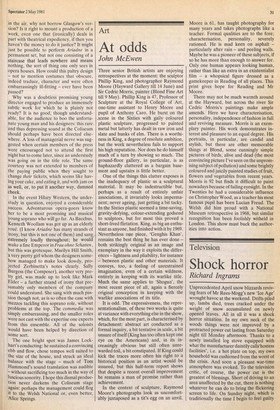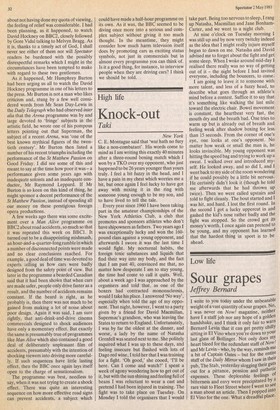Television
Shock horror
Richard Ingrams
Unprecedented April snow blizzards reviving fears of Mr Rees-Mogg's new 'Ice Age' wrought havoc at the weekend. Drifts piled up, lambs died, trees cracked under the weight of snow accumulated on newly opened leaves. All in all it was a shock horror situation. In my own neck of the woods things were not improved by a protracted power cut lasting from Saturday night till Monday afternoon. Thanks to a newly installed log stove equipped with what the manufacturer daintily callstostess facilities', i.e. a hot plate on top, my own household was cushioned from the worst of the crisis. And soon a pleasant war-time atmosphere was evoked. To the television critic, of course, the power cut is the greatest of blessings. Short of driving to an area unaffected by the cut, there is nothing whatever he can do to bring the flickering screen to life. On Sunday night, which is traditionally the time I begin to feel guilty about not having done my quota of viewing, the feeling of relief was considerable. I had been planning, as it happened, to watch David Hockney on BBC2, closely followed by Gore Vidal talking to Melvyn Bragg. As it is, thanks to a timely act of God, I shall never see either of them nor will Spectator readers be burdened with the possibly disrespectful remarks which I might in the circumstances have been tempted to make with regard to these two gentlemen.
As it happened, Mr Humphrey Burton had been urging us all to watch the David Hockney programme in one of his letters to the press. Mr Burton is not a man who likes criticism and, stung by a few well consi dered words from Mr Sean Day-Lewis in the Daily Telegraph who had observed inter alia that the Arena programme was by and large devoted to 'fringe' subjects in the artistic field, he wrote one of his pompous letters pointing out that Superman, the subject of a recent Arena, was 'one of the best known mythical figures of the twentieth century'. Mr Burton then listed a number of his recent triumphs including the performance of the St Matthew Passion on Good Friday. I did see some of this and meant to say at the time how poor it was — a performance given some years ago with inadequate soloists and an inadequate conductor, Mr Raymond Leppard. If Mr Burton is so keen on this kind of thing, he might sponsor a decent performance of the St Matthew Passion, instead of spending all our money on these prestigious foreign opera productions.
A few weeks ago there was some excitement over a Man Alive programme on BBC2 about road accidents, so much so that it was repeated this week on BBC1. It turned out to be a disappointing mishmash, an hour-nd-a-quarter-long,ramblein which a number of disconnected points were made and no clear conclusions reached. For example, a good deal of time was devoted to experts telling us how cars were badly designed from the safety point of view. But later in the programme a bearded Canadian said that it had been sho*n that when cars are made safer, people only drive faster as a result, and the number of accidents remains constant. If the beard is right, as he probably is, then there was not much to be gained from making a lot of noise about poor design. Again it was said, I am sure rightly, that anti-drink-and-drive cinema commercials designed to shock audiences have only a momentary effect. But exactly the same is presumably true of programmes like Man Alive which also contained a good deal of deliberately unpleasant film of accidents, presumably with the intention of shocking viewers into driving more carefully. If such sequences have little lasting effect, then the BBC once again lays itself open to the charge of sensationalism.
The programme was best, needless to say, when it was not trying to create a shock effect. There was quite an interesting sequence on how more effective road signs can prevent accidents, a subject which could have made a half-hour programme on its own. As it was, the BBC seemed to be diving once more into a serious and complex subject without giving it too much thought. In the meantime, they might consider how much harm television itself does by promoting cars as exciting status symbols, not just in commercials but in almost every programme you can think of. Is it a good thing, for instance, to interview people when they are driving cars? I think we should be told.



















































































 Previous page
Previous page